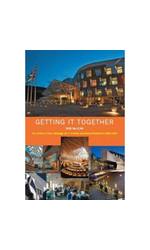Think Global, Act Local
Publisher: Luath Press Ltd
It’s time to look again at the originator of the phrase for our times – ‘Think Global, Act Local’
Town planning. Interest-led, open-minded education. Conservation of worthwhile buildings. Community gardens. All are so central to our society that we think we invented them. In fact they were visualised by Sir Patrick Geddes, one of the greatest forward-thinkers of the modern world.
A Victorian Scot, Geddes went out of fashion after his death but in recent years he has been become almost a patron saint of the sustainable development movement. His ideas and his practical example continue to inspire the world, in the present and in the future.
This new edition of Think Global, Act Local incorporates much new work on Geddes and examines in particular the question of how this Scot from a fairly humble background, with no university degree, could be welcomed into the Darwin/Huxley circle, could be the confidant of two Viceroys and twice be offered a knighthood.
About Narayani Gupta
Narayani Gupta has written on the history of modern Delhi, and has taught students of history and architecture. Patrick Geddes’s name came up frequently in discussions of urban history and modern planning, and many aspiring young architects showed tremendous interest in his ideas. It seems a good time to put some of them into practice.
About Sofia Leonard
Sofia Leonard is a Director of the Sir Patrick Geddes Memorial Trust. For ten years she was Director of the Patrick Geddes Centre for Planning Studies in the Outlook Tower. She has travelled in India investigating the legacy of Sir Patrick Geddes there.
About Murdo Macdonald
Murdo Macdonald is Professor of History of Scottish Art at the University of Dundee and a former Trustee of the Sir Patrick Geddes Memorial Trust. He has lectured and written extensively on Geddes and in 1992 edited a special edition of the Edinburgh Review devoted to him.
About Kenneth Maclean
Kenneth Maclean taught in Edinburgh and was a Lecturer in Moray House College of Education (now Faculty of Education, University of Edinburgh). Latterly he was Principal Teacher of Geography in Perth Academy (Patrick Geddes’s school). He has an interest in the history of geography teaching. One of his textbooks – S1/S2 Geography – has an introductory chapter ‘Introducing Place, People and Work’, whereby more young people in Scotland have been introduced to Geddes than through the combined efforts of all the pgmt trustees and directors.
About Walter Stephen
Walter Stephen could not proceed beyond Geology I at Edinburgh University due to colour blindness – the analysis of crystals and subtle maps were hidden worlds for him. Degrees in Geography, Economic History and Education qualified him as an academic jack-of-all-trades with a lifelong devotion to environmental awareness and understanding. One of his achievements was the establishment and operation for twenty years of Castlehill Urban Studies Centre, the first successful Urban Studies Centre in Britain.
A former Chairman of the Sir Patrick Geddes Memorial Trust, he has been responsible for Learning from the Lasses, A Vigorous Institution and Think Global, Act Local, collections of essays on Patrick Geddes. In his introduction to the new edition of A Herd of Red Deer he brought out the importance of Frank Fraser Darling as the founder of ecology and forerunner of David Attenborough. In The Evolution of Evolution Walter Stephen sets Darwin at the centre of a circle of Interesting Victorians. All six books, plus his biography of Willie Park Junior: The Man who took Golf to the World and Walter’s Wiggles were published by Luath Press.

































